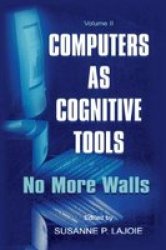Description
This article discusses how technology has changed in the past two decades and how this has influenced the way we learn. It provides examples of how different learning theories have been applied to computer-based learning, and it discusses how to design and assess learning using these theories.
Since the publication of the first edition of Computers as Cognitive Tools in 1993, rapid changes have taken place in the uses of technology for educational purposes and in the theories underlying such uses. Changes in perspectives on thinking and learning are guiding the instructional design of computer-based learning environments. Computers as Cognitive Tools, Volume II: No More Walls provides examples of state-of-the-art technology-based research in the field of education and training. These examples are theory-driven and reflect the learning paradigms that are currently in use in cognitive science. The learning theories, which consider the nature of individual learning, as well as how knowledge is constructed in social situations, include information processing, constructivism, and situativity. Contributors to this volume demonstrate some variability in their choice of guiding learning paradigms. This allows readers the opportunity to examine how such paradigms are operationalized and validated. An array of instructional and assessment approaches are described, along with new techniques for automating the design and assessment process. New considerations are offered as possibilities for examining learning in distributed situations. A multitude of subject matter areas are covered, including scientific reasoning and inquiry in biology, physics, medicine, electricity, teacher education, programming, and hypermedia composition in the social sciences and ecology. This volume reconsiders the initial camp analogy posited in 1993 edition of Computers as Cognitive Tools, and presents a mechanism for breaking camp to find new summits.
